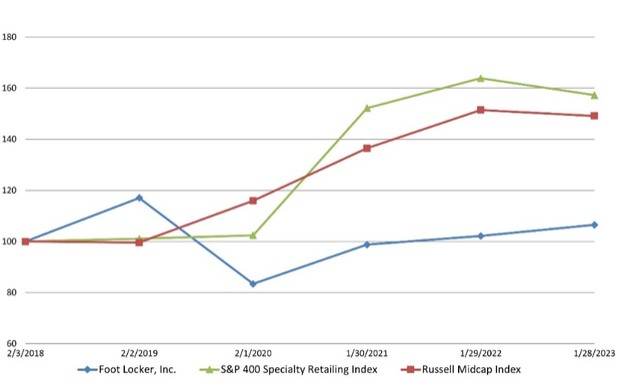Further, any terrorist act, natural disaster, public health issue, such as COVID-19, flu or other pandemics, or safety concern that decreases the level of mall traffic, or that affects our ability to open and operate stores in such locations, could have a material adverse effect on our business.
To take advantage of customer traffic and the shopping preferences of our customers, we need to maintain or acquire stores in desirable locations, such as in regional and neighborhood malls, as well as high-traffic urban retail areas and high streets. We cannot be certain that desirable locations will continue to be available at favorable rates. Some traditional enclosed malls are experiencing significantly lower levels of customer traffic, driven by economic conditions, public health issues, the closure of certain mall anchor tenants, and changes in customer shopping preferences, such as online shopping. Further, some malls have closed, and others may close in the future. While we seek to obtain suitable locations off-mall, there is no guarantee that we will be able to secure such locations.
Several large landlords dominate the ownership of prime malls and because of our dependence upon these landlords for a substantial number of our locations, any significant erosion of their financial condition or our relationships with them could negatively affect our ability to obtain and retain store locations. Additionally, further landlord consolidation may negatively affect our ability to negotiate favorable lease terms.
Our business could be materially harmed if we fail to adequately integrate the operations of the businesses we have acquired, or may acquire.
We have recently made, and may continue to make, acquisitions in the future based on available opportunities in the market. Acquisitions involve numerous inherent challenges, such as properly evaluating acquisition opportunities, properly evaluating risks and other diligence matters, ensuring adequate capital availability, and balancing other resource constraints. There are risks and uncertainties related to acquisitions, including difficulties integrating operations, personnel, and financial and other systems; unrealized sales expectations from the acquired business; unrealized synergies and cost savings; unknown or underestimated liabilities; diversion of management attention from running our existing businesses; and potential loss of key management or customers of the acquired business.
Our future growth may depend on our ability to expand operations in international markets.
Our future growth will depend, in part, on our ability to expand our business in additional international markets. As we expand into new international markets, we may have only limited experience in operating our business in such markets. In other instances, we may have to rely on the efforts and abilities of foreign business partners in such markets. In addition, business practices in these new international markets may be unlike those in the other markets we serve, and we may face increased exposure to certain risks. Our future growth may be materially adversely affected if we are unsuccessful in our international expansion efforts. Our inability to expand in international markets could have a material adverse effect on our business.
We may experience fluctuations in, and cyclicality of, our comparable-store sales results.
Our comparable-store sales have fluctuated significantly in the past, on both an annual and a quarterly basis, and we expect them to continue to fluctuate in the future. A variety of factors affect our comparable-store sales results, including, among others, fashion trends, product innovation, promotional events, the highly competitive retail sales environment, economic conditions, timing of income tax refunds, changes in our merchandise mix, calendar shifts of holiday periods, declines in foot traffic, supply chain disruptions, and weather conditions. Many of our products represent discretionary purchases. Accordingly, customer demand for these products could decline in an economic downturn or if our customers develop other priorities for their discretionary spending. These risks could have a material adverse effect on our business, financial condition, and results of operations.
The effects of natural disasters, terrorism, acts of war, acts of violence, and public health issues, such as COVID-19, may adversely affect our business.
Natural disasters, including earthquakes, hurricanes, floods, and tornadoes may affect store and distribution center operations. In addition, acts of terrorism, acts of war, and military action both in the United States and abroad can have a significant effect on economic conditions and may negatively affect our ability to purchase merchandise from suppliers for sale to our customers. Any act of violence, including active shooter situations and terrorist activities, that are targeted at or threatened against shopping malls, our stores, offices or distribution centers, could result in restricted access to our stores and/or store closures in the short-term and, in the long-term, may cause our customers and employees to avoid visiting our stores. The invasion of Ukraine by Russia and the retaliatory measures taken by the U.S., NATO, and other countries have created global security concerns and economic uncertainty that could have a lasting effect on regional and global economies.





